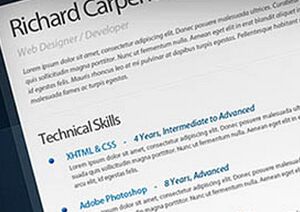简历忌冗杂,一页纸就能打动面试官
|
Should your resume be longer than one page, or should you try to condense it to keep it on a page? There isn't really a yes or no answer. The length of your resume depends on the type of candidate you are and your level of experience. How to Write a One Page Resume? In general, most employers want a concise resume without a lot of extraneous information. They only spend seconds reviewing it, so the more compact it is the easier it will be for the hiring manager or recruiter to review.
In addition, many employers use software to screen job application materials, so making sure your resume is focused on the job you're applying for will help you get chosen for an interview. In some cases, a longer resume might be in order. For example, graphic designers or visual artists might benefit from creating an illustrated resume, and academics, researchers, or long-time executives may need more than one page to capture the breadth of their experience. But, in general it's best to avoid overburdening busy recruiters with a resume that drags on and on. How Long Employers Want Resume to Be Benefits of a One Page Resume Especially if you're applying to a large company, there's a high likelihood that your resume will be printed out to be reviewed by multiple people, or at least shared electronically. Having a short and concise resume makes it easier on the hiring manager, and also increases your own chances of standing out. Unless you are explicitly asked to submit a specific type of resume, sticking to a simple, single page is a surefire way to make sure that it will be able to be downloaded - or printed out - and reviewed by anyone who needs to look at it. It's much easier to read a single page resume than it is to review a multi-page document. When to Use a Multi-Page Resume? According to the survey above, most employers want a one page resume unless the position requires experience. If a job wants an employee with extensive experience, you can and should include all of your applicable experience on your resume (although most employers do not want applicants to include more than 10-15 years of experience). There are also certain professions that are exceptions to the one page resume. For example, in academia, medicine, and international jobs, a curriculum vitae is often much longer than one page. Graphic designers or visual artists might also create an illustrated or graphic resume, which might exceed one page. However, these professions are the exception to the general rule that a one page resume is best. How to Cut and Trim a Resume Make sure everything you include in your resume is relevant to the position, down to your word choice. Because many employers use an applicant tracking system (ATS) to screen job application materials, try to use keywords from the application in your resume. This will increase your chances of making it past the first round of resume reviews. 首先你得确保简历里的所有信息都是针对你的目标职位,精细到用词。因为许多雇主会使用申请人跟踪系统(ATS)来审阅求职者的材料,然后使用一些关键词来进行简历定位。通过这种方法就能大大提高你的简历被选中的机会,从而进入面试阶段。 If you're struggling to pare down your resume to one page, start by creating an inventory of your accomplishments and work activities. List your responsibilities and your achievements in great detail. Your inventory document might span as many as three or four pages. Try to include a diverse spectrum of skills that have led to successes in each role. Analyze each job that you are considering and circle the statements that correspond most closely to the requirements for that particular position. Piece together the most relevant statements into a shorter, targeted version of your resume. The first draft might be longer than one page. If so, try to eliminate statements that provide less significant evidence regarding how you would add value in the role, until you get down to one page. Try to be as specific as possible with the information you list, and be as concise as you can in your writing. Use a bulleted list and keep your job descriptions concise. Focus on your accomplishments, not your daily responsibilities. Cut out any extra years. Even if you are an experienced candidate, you should include no more than 10 or 15 years of experience on your resume. |









